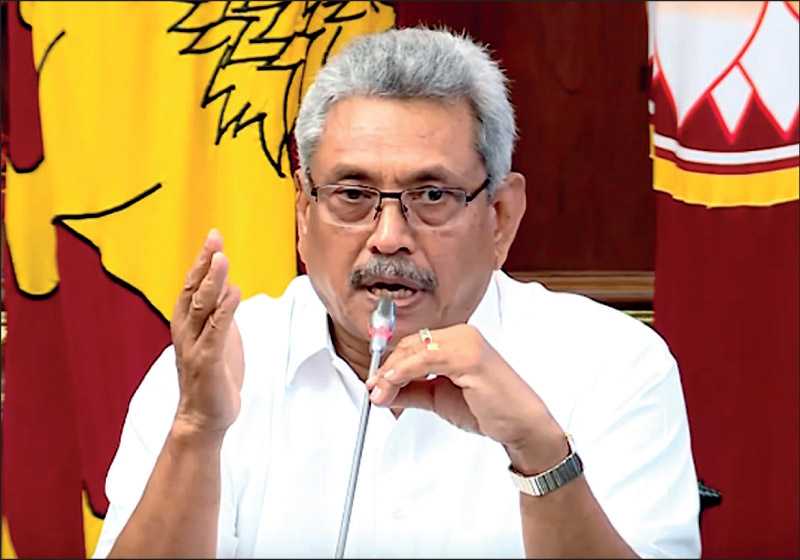Friday Feb 20, 2026
Friday Feb 20, 2026
Friday, 16 October 2020 01:00 - - {{hitsCtrl.values.hits}}

President Gotabaya Rajapaksa
A renowned writer and a foreign policy analyst, Dayan Jayatilleka in a recent media article titled ‘President GR’s Foreign Policy deviation,’ has referred to the current foreign policy of Sri Lanka in a highly critical sense. 
As the subject matter is of utmost importance to all of us, certain observations made by him need to be reviewed and pondered over. Hence the following concerns, along with more information relevant to the issue both in the international scenario as well as our own.
There are several obvious contradictions evident in DJ’s write up. He has quoted from a reference to his late father Mervyn de Silva, who pronounced that “abandonment of nonalignment was pioneered in the 1980s,” and further added that ‘its colossal fallacy was spotlighted by his father whose warnings proved prophetic in 1987’.
From this own admission if the policy change has been advocated in 1980s, we can only surmise that the idea of NAM has been a thing consigned to history long ago not by GR and MR as DJ is trying to propagate. Where, then, is the deviation in policy that Dr. Jayatilleka is trying to make out?
DJ accuses that Sri Lanka has just buried nonalignment and points out that President Gotabaya Rajapaksa has abandoned Sri Lanka’s long-held framework of ideas on the world. Two questions arise. If his statement ‘just buried’ is correct then what his late father has said about its abandonment in the ’80s has to be incorrect.
The other question is where did this ‘long-held framework of ideas on the world’ exist? As far as we know the Non-Aligned Movement was a matter of the past only. We haven’t seen any activity based on a nonaligned movement for a considerable period. It is a virtually forgotten affair in the modern world.
DJ refers to the 1956 UNGA address by SWRD to elucidate his position that President GR has omitted something that all previous leaders have done. That is the reference to Palestine in their addresses. A perusal of the UNGA address by SWRD in 1956, shows that he has not made any reference to Palestine as claimed by DJ in that address. One cannot accept there to be anything so sacred about repeatedly mentioning Palestine affair either. But certain references SWRD has specifically made in his address quoted below will certainly help us as useful material in our discussion today about the NAM.
Quote: “…That is why we do not range ourselves on the side of this power bloc or that power bloc. That is the philosophy of neutralism. It is not something dishonest; it is not a matter of sitting on the fence to see whether we can get the best of both world…”
I also wish to quote late Felix. R.D.B. on Non-Alignment. Following excerpts (Daily News, 16 August 1976) will be relevant. “NAM in its present sense came into being in the 1950s and in the early 1960s when leaders like Prime Minister Nehru of India, President Nasser of the U.A.R. as it was then called, President TITO of Yugoslavia, Prime Minister Sirimavo Bandaranaike of Sri Lanka and others decided to get together on the basis of principles they had adopted in their respective foreign policies which came to be described as “dynamic neutralism and non-alignment”.
In the same context he adds further: “Non-Alignment does not mean mere absence of alignments. The positive concept of non-alignment is peaceful co-existence something much more than merely getting rid of old rivalries. It is a positive search for a new era of co-operation in place of the confrontation of the past. NAM is not ideologically tied. It does not have a common ideology as such. Many countries sway in favour of the ideology to another. The desire of nations to pursue independent policies for the good of their own people is fundamental to NAM.”
DJ’s conceptualisation of a doctrine behind the NAM is only an imagination. The neutralism and non-alignment are features inseparable. In the absence of an active Movement there is absolutely no evil in continuing with the neutral concept. After all a movement for non-alignment itself is an alignment whereas independent neutralism is more desirable under a League of Nations advancing to provide equal opportunities in a modern world.
DJ’s observations on the securing of safety through numbers and his gradation of countries as big and small appears to emanate from a weak and subjugated mind set. It is more advantageous to use the neutral concept relying on our geo-political strengths and to engage in discussions to mobilise support towards our goals in our national interests. It is an undeniable fact that national interest enjoys considerable favour and respect in reference to the domestic policies of nations.
Neutralism, also called Nonalignment, in international relations, the peacetime policy of avoiding political or ideological affiliations with major power blocs. Therefore MR and GR have not committed any sins as alleged by DJ. Perhaps DJ is well aware of the ongoing debate about the ‘national interest’ that he has referred to in his article. Global analysts have given objective as well as subjective connotations to “national interest”. The sum total of the reality is that ‘national interest’ is not a static thing and change in accordance with many other factors.
Let me quote from a historically renowned analyst in this regard: “National interest is the perennial standard by which political action must be judged and directed, therefore the objective of a foreign policy must be defined in terms of the national interest. And exactly what constitutes this national interest? The kind of interest determining political action and cultural context within which foreign policy is formulated.”
It has been reasoned that nations do what they do in order to satisfy their best interests and that by describing these needs and wants the analyst would be in a position to use the concept of national interest as a tool for explanation.
DJ cannot be oblivious to the fact that our country is facing the most controversial focus by different global power blocs as never before, now. Sticking to old values and theories hardly applicable in the current context would be a folly and choosing such dogmas to politically castigate the leaders is equally bad. Let us look forward. There cannot be any precariousness in following a neutral foreign policy as DJ attempts to make out!
The allegation of a deviation in policy by the MR/GR Government is therefore wrong. However, there is justification for anybody to put a blame on the Government for not initiating a new concept in keeping with the international trends to introduce a scheme, plan or an idea more suited in the current context. This is but a responsibility devolving on the many advisers sitting round the Government decision making circles.